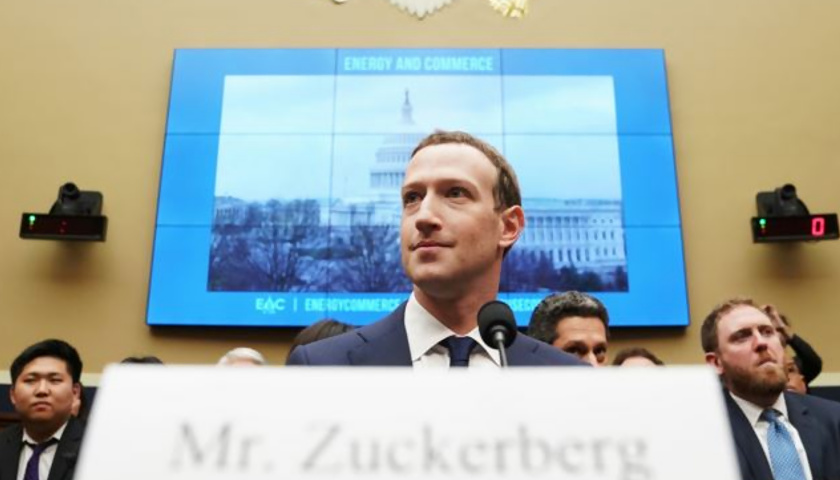State Senator Jake Hoffman (R-Queen Creek) announced Sunday evening that he was launching an investigation into how students from Arizona State University, the University of Arizona, and Northern Arizona University received text messages from the Kamala Harris presidential campaign on the last day before voter registration ends in the state. Hoffman, who chairs the Senate Committee on Government, expressed concern that it might violate FERPA, the Family Educational Rights and Privacy act that protects students. Hoffman told The Arizona Sun Times on Sunday, “I was made aware of this breach of security by dozens of students today, and intend to throw the full weight of the Arizona Senate into ascertaining how the Harris campaign acquired these students’ legally protected personally identifiable information.” The College Republicans at ASU broke the story on X on Sunday. They posted, “150,000 students from ALL Arizona universities including ASU and UofA have received a text from Kamala Harris’ campaign telling the students to vote for her. If Kamala Harris has access to all of Arizona college students’ phone numbers, what ELSE do they have?” 🚨MAJOR BREAKING: 150,000 students from ALL Arizona universities including ASU and UofA have received a text from Kamala Harris' campaign telling…
Read the full storyTag: privacy
Michigan Supreme Court Ponders Privacy Limits for Drones
The Michigan Supreme Court heard arguments Wednesday about whether the government can use drones to surveil private property without a warrant and use that evidence in court for zoning disputes.
For two years, Long Lake Township zoning officials flew a drone over Todd and Heather Maxon’s property in northern Michigan near Traverse City, taking photographs and videos as part of a zoning dispute that he was running an illegal junkyard.
Read the full storyFreshly Launched Search Engine Allows Users to ‘Take Back the Power’ in Online Searches
A new search engine launched titled “Luxxle” prides itself on giving users more power when it comes to searching up content and more privacy.
“Luxxle is a search engine that provides a platform for publications of all size and voice to be discovered,” Luxxle communications director Molly Koweek told Just the News in an exclusive interview. “It’s a search engine that remains unbiased which is something you don’t have right now with the big search engines.”
Read the full storyCommentary: Senator Marsha Blackburn is Doing What Other Lawmakers Aren’t
Initially, many of us welcomed the advent of companies like Facebook and Twitter. They helped us reach out to people we hadn’t spoken to in years and served as a way to get our news every day. But, as time went on, Big Tech has become a menace to the American people. For years, they have been stealing peoples’ data and selling users’ information online.
Read the full storySuspended Vermont Student and Coach Father Sue School District for Retaliating After Complaint About Biological Male in Girls’ Locker Room
A Vermont high school volleyball player who was suspended from school and her father, the team’s coach, who was suspended from his job, are suing the school district for retaliating against them following their complaint about the policy that allows biological males in the girls’ team locker room.
Blake Allen, 14, a student at Randolph Union Middle School, and her father, Travis Allen, who coaches his daughter’s volleyball team, spoke out against a biological male, claiming to be female, being allowed in the girls’ team locker room while they were changing. Now, the family is suing the school district after Blake was suspended and Travis was fired from his job, asserting the district retaliated against them, the Daily Signal reported Thursday.
Read the full storyArizona AG Brnovich Discusses Settlement with Google over Deceptively Obtaining Users’ Location Data for Profit
Arizona Attorney General Mark Brnovich has sued numerous big players throughout his two terms, including the Biden administration, Secretary of State Katie Hobbs, Arizona State University, and the City of Tucson. Perhaps the biggest entity he sued was Google in 2020, for “deceiving consumers” by tracking their location on smartphones without their knowledge and then selling the information. After over two years of litigation, the tech giant capitulated, settling for $85 million, more than the country of Australia snagged in a similar settlement with Google, $60 million.
The first attorney general in the country to sue Google over the practice, Brnovich told The Arizona Sun Times that what prompted him in part to file the complaint was the shocking extent of how much personal information was obtained. “Google knew more about where you were going and who you hung out with, more than your travel agent or spouse,” he said. He found out about the practice after a news article revealed that Google was tracking users through its app preloaded on Android smartphones even after they’d disabled their “Location History” setting. Google was told to stop and did not.
Read the full storyVermont High School Girls Volleyball Team Banned from Locker Room After Objecting to Trans Player’s Presence
The Randolph Union High School girls’ volleyball team in Vermont was reportedly banned from its locker room after some girls on the team objected to the presence of a biological male, who claims to be female, while the girls were changing clothes.
School officials, WCAX-TV reported, banned the girls from their locker room because Vermont’s policy states transgender athletes can participate on sports teams and use the private facilities consistent with their chosen gender.
Read the full storyEpoch Times Digital Reporter Beth Berlje Uncovers ‘Smart Pass’ Used to Track Students and Facilitate Data Mining
Friday morning on The Tennessee Star Report, host Leahy welcomed Digital Reporter for The Epoch Times, Beth Brelje to the newsmaker line to discuss her recent article and the data mining of children.
Read the full storyAnti-Science Biden Administration to End Protections for Girls Title IX Ensured in 1972
The Biden administration is determined to undermine the science of biology in order to prop up an activist political agenda that will serve up a manufactured concept of limitless “genders” with a side order of government-approved child grooming opportunities.
The proposed Title IX rule, announced in June by Education Secretary Miguel Cardona, is designed to overturn the Trump administration’s desire to continue enforcement of Title IX’s protections for girls and women in education. Former President Donald Trump also ensured due process rights protections for those students accused of sexual misconduct.
Read the full storyJenny Beth Martin of Tea Party Patriots on IRS: ‘Another Example of How This Administration and the Radical Leftists Want a Centralized Power to Control People Around the Country’
Friday morning on The Tennessee Star Report, host Leahy welcomed to the newsmaker line Jenny Beth Martin, co-founder of the Tea Party Patriots and columnist for The Washington Times, to voice deep concerns with the IRS’s intent on auditing middle-class Americans and violating the rights and privacy of citizens.
Read the full storySenator Marsha Blackburn Responds to Big Tech’s Disdain for Privacy, Rules, and Regulations with the Open App Markets Act
Thursday morning on The Tennessee Star Report, guest host Aaron Gulbransen welcomed Senator Marsha Blackburn to the newsmaker line to discuss her recent op-ed that addresses how to get them to abide by rules, regulations, privacy and reforms for Section 230.
Read the full storyOklahoma Gov. Kevin Stitt Signs Bill Requiring Students to Use Restrooms Corresponding to Sex on Birth Certificate
Oklahoma Governor Kevin Stitt signed a bill into law Wednesday that requires students to use school restrooms that correspond to their sex as indicated on their birth certificates.
Stitt signed the bill after the state Senate and House approved it, 38-7 and 69-14, respectively.
Read the full storyBill Would Give Legislators Access to Connecticut Residents’ Tax Returns
Connecticut leftists are promoting legislation that would let lawmakers request and receive copies of any residents’ tax return.
Advocates for the bill are basing their case on “fairness and equality,” insisting that access to individuals’ financial information will help them improve tax policy from a progressive standpoint, i.e. claim more revenue from higher-income earners.
Read the full storyIRS Reverses Plans for Facial Recognition Software on Its Website
On Monday, the Internal Revenue Service (IRS) announced in a statement that it would no longer be moving forward with previous plans to implement a controversial facial recognition software on its website in order for users to access certain tax records.
According to CNN, the IRS’s reversal came after widespread backlash by elected officials, privacy groups, and others who pointed out that such technology would constitute a massive overreach and violation of individual privacy. The IRS said in its statement that it would “transition away from using a third-party verification service involving facial recognition,” and would instead add an “additional authentication process.” The agency also vowed to “protect taxpayer data and ensure broad access to online tools.”
“The IRS takes taxpayer privacy and security seriously,” IRS commissioner Chuck Rettig said, “and we understand the concerns that have been raised. Everyone should feel comfortable with how their personal information is secured, and we are quickly pursuing short-term options that do not involve facial recognition.”
Read the full storyCommentary: Six Cultish Things Globalist Elites Want You to Look Forward to in 2022—and Beyond
The year is 2022. The place: a New York City so overpopulated that everyone is sleeping and dying on outdoor stairways. All sweating like pigs because of global warming. People have become unwitting cannibals because there is no more food. Elites still dine on delectables, but all that remains for the hoi polloi is the promise of a green wafer allegedly made of plankton, but in reality “It’s PEOPLE!!”
That’s the setting of the over-the-top 1973 movie “Soylent Green,” produced in the wake of Paul Ehrlich’s classic fear porn book The Population Bomb. Time has proven Ehrlich’s predictions of mass starvation due to population growth to be massively wrong. Ehrlich also lost his famous wager with the economist Julian Simon who predicted a more prosperous world. Still, Malthusian propaganda dies hard because it’s such an effective tool for social engineering.
“Soylent Green” is a random example, chosen because its year 2022 happens to be upon us. Certainly, dates and science used in science fiction have a heavy emphasis on fiction. The “Blade Runner” rebellion of genetically designed replicants was set in 2019. And, of course, Big Brother ruled in George Orwell’s 1984. Though much has come to pass, including genetic engineering and the surveillance state, there’s proof enough that we can’t predict the future with certainty.
Read the full storyBuckeye Institute Testifies Before Ohio House Committee on Privacy Bill
A representative from The Buckeye Institute, a free-market advocacy think-tank, testified before the Ohio House of Representatives’ Government Oversight Committee about a bill that would protect consumer data, protecting Americans’ privacy.
HB 376 says that “a consumer has a right to know the personal data that a business collects about that consumer, such as by obtaining a privacy policy from the business.”
Read the full storyGeorgia Tea Party Patriots Slam Biden, IRS over Plan to Track Bank Accounts
After the Biden Administration announced that it plans to track every American bank account with $600 or more via the Internal Revenue Service, Georgia’s Tea Party Patriots responded with a harsh rebuke.
Read the full storyIWF’s Kelsey Bolsar Reveals Pregnant Women’s Concerns with Employer Mandated Vaccines and Safety
Wednesday morning on the Tennessee Star Report, host Michael Patrick Leahy welcomed Independent Women’s Forum Senior Policy Analyst and The Federalist contributor Kelsey Bolsar to the newsmakers line to discuss employer vaccine mandates and safety, privacy concerning pregnant women.
Read the full storyGiuliani: DOJ Prosecutors ‘Invaded’ His iCloud Account in 2019 While He Was Defending Trump for Impeachment Sham
Former New York City Mayor Rudy Giuliani revealed on Fox News Thursday night that prosecutors in the Justice Department secretly “invaded” his iCloud account and seized privileged documents. Giuliani later tweeted about the potentially illegal surveillance, asking “who else are they spying on? You?”
The DOJ told my lawyer they secretly went into my iCloud account in 2019.
Who else are they spying on? You?
— Rudy W. Giuliani (@RudyGiuliani) April 30, 2021
Giuliani, Trump’s personal lawyer, gave his first television interview after the FBI raided his home to Fox’s Tucker Carlson.
The feds executed a search warrant Wednesday morning on Giuliani’s Upper East Side apartment over his alleged unregistered lobbying for foreign governments. Giuliani said about seven or eight electronic devices were seized during the raid.
President Trump told Fox Business on Thursday that Giuliani was “the greatest mayor in the history of New York” and “a great patriot.”
Read the full storySenator Marsha Blackburn Talks About Her Newly Proposed Open Technology Fund Authorization Act
Live from Music Row Thursday morning on the Tennessee Star Report with Michael Patrick Leahy – broadcast on Nashville’s Talk Radio 98.3 and 1510 WLAC weekdays from 5:00 a.m. to 8:00 a.m. – host Leahy welcomed Sen. Marsha Blackburn to the newsmakers line.
During the third hour, Blackburn explained her bill called the Open Technology Fund Authorization Act which would provide safeguards as more Americans move online with their work and transactions. She added that it was important to protect what she calls our “virtual view” while China shows increased proof of global domination.
Read the full storyBlack Lawmakers Want State to Stop Giving Names, Addresses of COVID-19 Patients to Police
The Tennessee Black Caucus of State Legislators wants the state to quit giving names and addresses of COVID-19 patients to police.
The caucus made the request to Gov. Bill Lee and the Tennessee Department of Health, WATE reported, citing a press release from Democratic Caucus Chairman Ken Jobe. Lee sent letters to Tennessee police offering to provide personal information to their departments once they’ve entered into a Memorandum of Understanding with the state.
Read the full storyZoom Recruits Former Facebook Security Chief as Critics Bash the Tech Firm for Privacy Lapses
An upshot tech company recruited Facebook’s former security chief to help fix glitches in the firm’s video chat app that reports say are leaving customers vulnerable to hackers and spammers.
Former Facebook executive Alex Stamos announced Thursday that he is joining an effort to help Zoom right the ship after reports revealed problems in its security system. Stamos made the decision to help after CEO Eric Yuan contacted him after he tweeted out some advice on the topic.
Read the full storyREPORT: Google Is Working On Secret Project To Collect Personal Health Data On Millions Of Americans
Google is reportedly partnering with the second-largest health care system in the U.S. in an effort to collect health data on millions of Americans, according to people familiar with the matter.
Read the full storyFacebook’s New ‘Privacy Vision’ Raises Questions but Offers Few Answers, For Now
Mark Zuckerberg’s abrupt Wednesday declaration of a new ‘privacy vision’ for social networking was for many people a sort of Rorschach test. Looked at one way, the manifesto read as an apology of sorts for Facebook’s history of privacy transgressions, and it suggested that the social network would de-emphasize its huge public social network in favor of private messaging between individuals and among small groups. Looked at another way, it turned Facebook into a kind of privacy champion by embracing encrypted messaging that’s shielded from prying eyes – including those of Facebook itself. Yet another reading suggested the whole thing was a public relations exercise designed to lull its users while Facebook entrenches its competitive position in messaging and uses it to develop new sources of user data to feed its voracious advertising machine. As with many things Facebook, the truth lies somewhere in between. Facebook so far isn’t elaborating much on Zuckerberg’s manifesto. Here’s a guide to what is known at the moment about its plans. What’s happening to Facebook? In one sense, nothing. Its existing social network, with its news feeds and pages and 2.3 billion global users and $22 billion in 2018 profit, won’t change and will…
Read the full storyFacebook Gave Data on Users’ Friends to Some Firms While Barring Others
Facebook Inc let some companies, including Netflix and Airbnb, access users’ lists of friends after it cut off that data for most other apps around 2015, according to documents released on Wednesday by a British lawmaker investigating fake news and social media. The 223 pages of internal communication from 2012 to 2015 between high-level employees, including founder and Chief Executive Mark Zuckerberg, provide new evidence of previously aired contentions that Facebook has picked favorites and engaged in anti-competitive behavior. The documents show that Facebook tracked growth of competitors and denied them access to user data available to others. In 2014, the company identified about 100 apps as being either “Mark’s friends” or “Sheryl’s friends” and also tracked how many apps were spending money on Facebook ads, according to the documents, referring to Zuckerberg and Chief Operating Officer Sheryl Sandberg. The insight into the thinking of Facebook executives over that period could invite new regulatory scrutiny into its business practices. Facebook said it stood by its deliberations and decisions, but noted that it would relax one “out-of-date” policy that restricted competitors’ use of its data. One document said such competitor apps had previously needed Zuckerberg’s approval before using tools Facebook makes…
Read the full storyFacebook CEO Says Regulation of Internet Sector is ‘Inevitable’
Facebook CEO Mark Zuckerberg told lawmakers Wednesday the internet sector will need some form of regulation. After weathering heated questions from two Senate panels, Facebook CEO Mark Zuckerberg returned to Capitol Hill Wednesday to face more questions from the House Energy and Commerce Committee about the social media platform’s transparency and user privacy.
Read the full storyFacebook Announces New Steps to Protect Users’ Privacy
Facebook said Wednesday it will overhaul its privacy settings tools to put users “more in control” of their information on the social media website. The updates include improved access to Facebook’s user settings and tools to easily search for, download and delete personal data stored by Facebook.
Read the full story

























